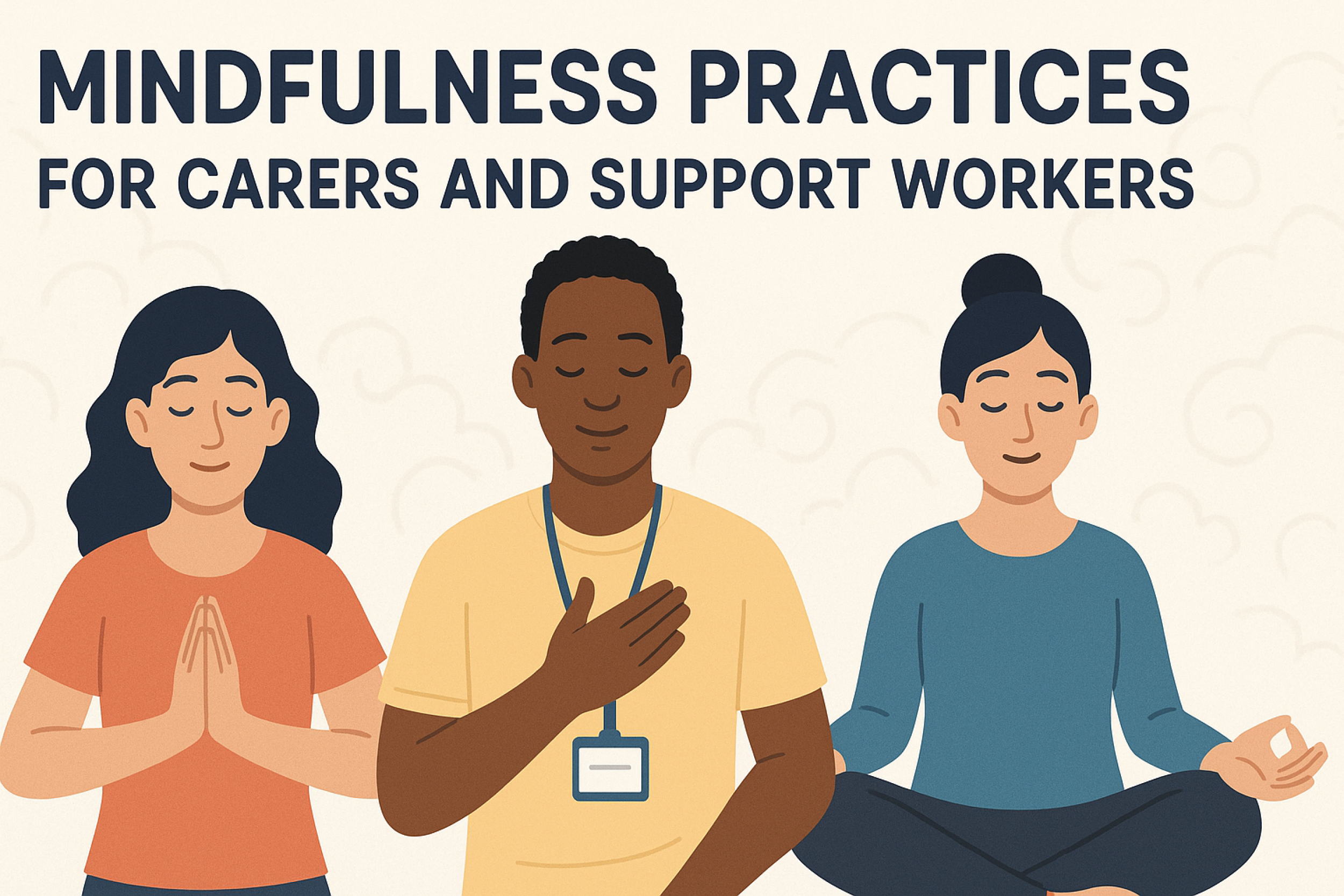Mindfulness Practices for Careers and Support Workers
Caring is a beautiful act of service—but it can also be physically and emotionally demanding. Support workers often find themselves giving so much to others that they forget to give even a sliver of care back to themselves. That’s where mindfulness becomes not just helpful, but essential.
Mindfulness means paying full attention to the present moment with kindness, curiosity, and without judgment. It’s about slowing down enough—internally, if not physically—to notice what’s happening around you and within you. It’s not about doing less, it’s about doing what you do with more presence and compassion.
🌞 Mindful Moments Throughout a Carer’s Working Day
Here’s how staff can gently weave mindfulness into everyday care work—without needing extra time, fancy equipment, or a quiet room.

🛏️ 1. Starting the Day: Grounding Before the Shift
Before entering the home or shift setting:
Sit in your car or stand at the door.
Close your eyes and take three slow breaths.
Ask yourself: “What intention do I want to bring today?”
Example: “I want to be patient.” “I want to listen more.” “I want to stay grounded.”
🌟 Why it helps: Intention-setting focuses your energy, helps avoid reactive habits, and strengthens emotional resilience.
🍽️ 2. During Mealtimes: Practice Deep Listening
When sitting with a person you support:
Tune in to their body language and tone.
If they speak, listen fully—without mentally jumping ahead.
Notice your own posture: are you relaxed or tense?
Chew a bite of food slowly and savour it (if you’re eating too).
🌟 Why it helps: Shared mealtimes can be sacred social spaces. Mindful presence fosters connection and emotional safety.
🧹 3. While Doing Tasks: Turn Chores Into Mini Meditations
Support workers are always doing—cleaning, prepping, assisting, checking. Try this:
Focus on one sense during a task: the warmth of water while washing, the scent of soap, the feel of a soft blanket.
Bring attention to your movements. Breathe slowly as you fold, scrub, or arrange.
Use repetitive motions (like brushing hair or making a bed) as rhythm cues to slow your thoughts.
🌟 Why it helps: Instead of rushing, mindfulness turns routine tasks into calming rituals.
💬 4. During Conversations: Create ‘Kind Space’
When a person you support is speaking (even if distressed or confused):
Pause internally before responding.
Nod, smile, or offer a gentle word like, “I hear you.”
Breathe in calmly before answering.
🌟 Why it helps: Staying grounded helps avoid overwhelm and lets the person feel seen and valued.
🚶 5. Between Activities: Use Transitional Moments to Breathe
Walking from one room to another? Waiting for a kettle to boil?
Pause for one full breath.
Scan your body for tension. Can you soften your shoulders or jaw?
Try a simple affirmation like: “In this moment, I am calm.”
🌟 Why it helps: Transitional pauses are powerful reset points that bring balance to busy shifts.
📋 6. After Challenging Moments: The 5-Second Reset
Care work includes emotional highs and lows. When things get tough:
Step away for a brief moment (even just into the hallway).
Place a hand on your chest and take one deep, full breath.
Silently repeat: “This is hard, but I’m doing my best.”
🌟 Why it helps: Self-kindness reduces stress and prevents emotional fatigue.
🕯️ 7. At Day’s End: Reflect with Gratitude
As your shift ends:
Note one thing you feel proud of today (big or small).
Name one moment of connection or joy.
If things went wrong, forgive yourself with kindness: “I’ll try again tomorrow.”
🌟 Why it helps: Gratitude boosts well-being and helps staff leave work feeling positive and valued.

